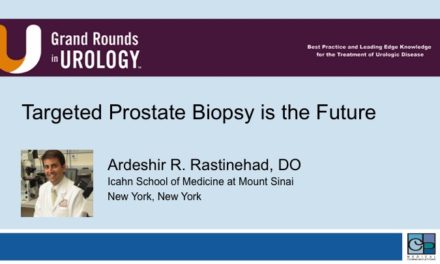Anders Bjartell, MD, PhD, FEBU presented “Organized Prostate Cancer Testing (OPT) in Sweden” during the 9th Global Summit on Precision Diagnosis and Treatment of Prostate Cancer on September 15, 2025.
How to cite: Bjartell, Anders. “Organized Prostate Cancer Testing (OPT) in Sweden.” September 15, 2025. Accessed Nov 2025. https://grandroundsinurology.com/organized-prostate-cancer-testing-opt-in-sweden/
Organized Prostate Cancer Testing (OPT) in Sweden – Summary
Anders Bjartell, MD, PhD, FEBU, details the nationwide implementation of Organized Prostate Cancer Testing (OPT) in Sweden. He shares that structured PSA-based testing, MRI, and registry linkage provide evidence for smarter population-level screening while avoiding overdiagnosis.
Dr. Anders Bjartell, MD, PhD, FEBU, Professor of Urology, Skåne University Hospital, Malmö, and Lund University, Sweden, describes the development and progress of the Organized Prostate Cancer Testing (OPT) program. Despite evidence from randomized trials showing reduced prostate cancer mortality with prostate-specific antigen (PSA) screening, national guidelines have not recommended population-based screening due to risks of overdiagnosis and overtreatment. Instead, Sweden has pursued organized testing as a structured alternative.
OPT began as a coordinated, registry-linked program for men aged 50 to 74. Invitations and follow-up are algorithm-based, with schedules determined by baseline PSA. Men with PSA <1 ng/mL are re-invited after six years, those with PSA 1–2.9 ng/mL after two years, and those with PSA ≥3 ng/mL undergo magnetic resonance imaging (MRI) and possible biopsy, with re-invitation at two years if cancer is not found. MRI interpretation and biopsy decisions are standardized using prostate imaging reporting and data system (PI-RADS)S criteria and PSA density.
By December 2022, more than 250,000 men had been invited, with a 43 percent participation rate. Approximately 3,600 MRIs and 1,300 biopsies were performed, leading to 900 prostate cancer diagnoses, two-thirds of which were treated with curative intent. Data is captured digitally and linked to the Swedish National Prostate Cancer Registry, enabling high-quality monitoring and research.
18 of 21 Swedish regions now participate in OPT, providing a unique opportunity to compare different regional algorithms and identify best practices for minimizing overdiagnosis while ensuring early detection of clinically significant disease. Dr. Bjartell emphasized that OPT results will inform whether Sweden should adopt a national screening program within the next few years.
The Global Summit on Precision Diagnosis and Treatment of Prostate Cancer is a unique multi-disciplinary forum organized to inform the key health care stakeholders about the emerging advances in clinical case and research and create a consensus-based vision for the future of precision care and educational and research strategy for its realization. The mission of the Summit is to fill the currently existing gap between the key experts of in vivo imaging, the world authorities in the in vitro fluid- and tissue-based molecular diagnostics, including genomics, and thought leaders in the development of novel observation strategies (e.g., active surveillance, or AS) and therapeutic interventions.
ABOUT THE AUTHOR
Anders Bjartell, MD, PhD FEBU, serves as a Professor of Urological Cancer and Epidemiology, Principal Investigator, and a Researcher in eSSENCE at Lund University in Lund, Sweden. Dr. Bjartell’s research encompasses clinical projects on robotic surgery, imaging, and drug development.
Dr. Bjartell leads a research group in translational prostate cancer research with long term experience in prostate cancer biomarkers. He has been the principal investigator for several trials of new drugs in castration resistant prostate cancer, and has published over 400 articles in his field.




